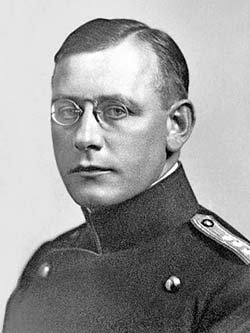Editor’s Note: This article is in honor of International Holocaust Remembrance Day, Jan. 27, 2025.
By Gedaliah Borvick


(Photo: Wikipedia)
JERUSALEM — Streets in Jerusalem and Petach Tikvah bear the name of Paul Gruninger, a Swiss police officer who stood as a beacon of humanity during one of history’s darkest chapters. In 1938, Paul Gruninger chose to defy heartless government policies with acts of extraordinary bravery, saving thousands of Jewish lives as Europe descended into madness.
The rise of Adolf Hitler in 1933 marked the ascension of the Nazi Party’s antisemitic agenda. By 1938, after the Anschluss (Germany’s annexation of Austria), the persecution of German and Austrian Jews had escalated into brutal violence and relentless discrimination.
Chaim Weizmann, Israel’s first President, stated bitterly that the world in 1938 was divided into two camps: those who wanted to get rid of the Jews and those who refused to give them refuge. Switzerland fell firmly into the latter category. Despite its neutrality, the country enforced strict immigration policies during the lead-up to World War II, refusing refuge to many desperate Jews fleeing persecution.
Amid this apathy, Paul Gruninger, the police chief of St. Gallen near the Austrian border, took a brave stand. A kind soul who was previously a schoolteacher, Gruninger placed ethical values above his career and personal well-being and saved around 3,600 Jews from the Nazis by falsifying passport documents and granting them illegal entry into Switzerland. In addition, he used his own money to buy winter clothes for needy refugees and also helped them find housing.
Paul Gruninger paid a steep price for having the moral courage to disobey explicit instructions of the Swiss government. He was dismissed from the police force, convicted of breach of duty, official misconduct and forgery, and served time in prison. Sadly, Gruninger was ostracized, stripped of his pension and benefits, and died in poverty in 1972.
Yet Gruninger remained unrepentant. In 1954, he reflected on his decisions with unwavering conviction:
“I am not ashamed of the court’s verdict. On the contrary, I am proud to have saved the lives of hundreds of oppressed people. . . . It was basically a question of saving human lives threatened with death. How could I then seriously consider bureaucratic schemes and calculations? Sure, I intentionally exceeded the limits of my authority and often with my own hands falsified documents and certificates, but it was done solely in order to afford persecuted people access into the country. My personal well-being, measured against the cruel fate of these thousands, was so insignificant and unimportant that I never even took it into consideration.”
When Paul Gruninger passed away in 1972, his good deeds were still not recognized by his homeland. It wasn’t until 1995 that a St. Gallen court posthumously cleared his name. The following year, Swiss officials apologized to his family, acknowledging their country’s restrictive refugee policy as one of the darkest moments in its history.
Despite the suffering he experienced for decades, Gruninger’s legacy of courage and compassion endures. In 1971, Yad Vashem awarded him the Medal of Honor and recognized him as Righteous Among the Nations. Summing up his sacrifice, Yad Vashem stated: “Gruninger paid a high price for the choice he made. In the struggle between his sense of duty as a police officer and his dedication to the concepts of humanity, the latter triumphed.”
Paul Gruninger’s story reminds us that the courage to do what is right often demands great personal sacrifice. While we pray never to face such harrowing choices, may Gruninger’s moral clarity and compassion inspire us to stand firm in the face of injustice and hatred.
*
Gedaliah Borvick is the founder of My Israel Home, a real estate agency focused on helping people from abroad buy and sell homes in Israel. His blog is at www.myisraelhome.com.